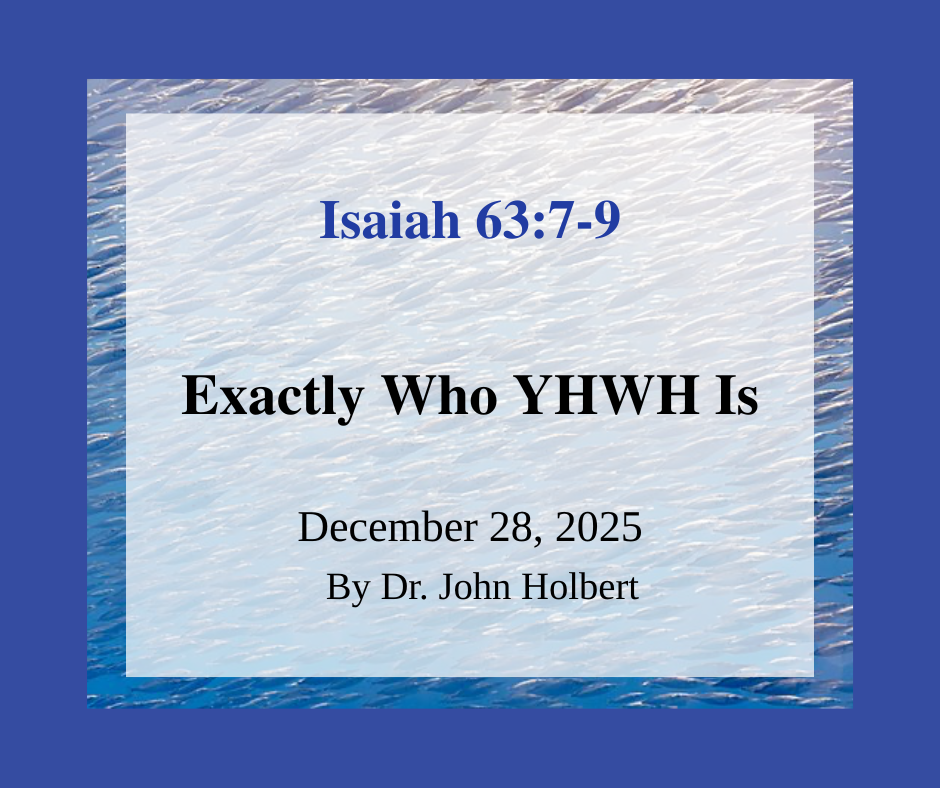Exactly Who YHWH Is - Reflections on Isaiah 63:7-9, Christmas 1, Year A
by John C. Holbert on Thursday, October 23, 2025

This tiny three-verse text chosen for the first Sunday after Christmas is simply chock-full of the adjectives and nouns used in the Hebrew Bible to describe and extoll YHWH, God of Israel. After reading this passage, one will know intimately just what Israelite believers thought of the God they worshipped, how that God was to be understood, and what words served best to define YHWH. The text is nothing less than a compendium of divine descriptive words. I propose in this essay to examine each of these crucial words in order to better assess just who the Bible thinks YHWH is, and by doing so I hope to demonstrate how such knowledge can help us Christians better understand that God we come to celebrate each Sunday. What better way to begin another year with God!
Is.63:7a at its very beginning gives us a word to describe YHWH that is both central to YHWH’s being and very difficult adequately to translate. That word is chesed, and the NRSV invariably reads it in its simple noun form “steadfast love,” attempting to capture the unbreakable fixedness of YHWH’s love for the people. In vs.7 it appears in the form of a plural noun in a construct, or possessive state. Hence, Isaiah asks his hearers/readers to “remember YHWH’s gracious deeds” (so NRSV); I might read it “YHWH’s unbreakable actions of love,” perhaps a bit clumsy but closer to the fuller meaning of the word. The second word found in Is.63:7a is translated by NRSV as “praiseworthy acts.” It does come from the common verb “to praise,” and it seems to imply something like “deeds calling for praise,” hence can be seen as a repetition of the first line—these “unbreakable actions of YHWH” are indeed praiseworthy.
Praise is called for due to “all YHWH has dealt out to us,” using the verb gamal, especially for the “great good” (NRSV’s “favor” is a stretch) YHWH has given to the house of Israel, and because of “what YHWH has dealt out to us out of YHWH’s compassion” (Is.63:7c). NRSV invariably translates this wonderful word (rechem) as “mercy,” but since it is derived from the Hebrew for a woman’s womb, I want a stronger word, and “compassion” for me at least partially fits the bill. However, as a male, I need to speak with a pregnant woman to learn more about how she feels about the child in her womb to get a fuller understanding. Is.63:7 ends with a repetition of that word chesed, this time used as a sign of YHWH’s vast unbreakable love out of which YHWH’s actions for the people flow.
“Surely they are my children, who will not deal falsely” (Is.63:8). Of course, these people throughout Israel’s long history have done little but deal falsely! But now in the presence of this YHWH, ripe with chesed and rechem, they will no longer act in such ways. “YHWH became their savior in all their wretchedness” Is.63:8-9a (again I find NRSV’s “distress” not strong enough). The word “savior” is formed from the famous verb that often designates the actions of YHWH in the Exodus from Egypt; it was then that YHWH acted most memorably and powerfully, but YHWH is about to act in the same fashion now. “No enemy angel acted; rather YHWH’s presence rescued them” (Is.63:9b). The text is difficult here; the NRSV footnote suggests “In all their distress he was distressed; the angel of his presence saved them.” This requires a few textual changes, and I doubt that translation improves our understanding much.
But the ending of the passage is generally plain enough. “In YHWH’s love and mercy, YHWH liberated them; YHWH lifted them, carried them even from ancient days” (Is.63:9c). YHWH’s redemption is based on YHWH’s “love” (ahab) and “mercy” (chamal— NRSV “pity”). The last three words of the text are not easy to grasp—NRSV reads “all the days of old,” which is possible but rather opaque. The first two Hebrew words are “all the days,” but the third is that famous conundrum, ‘olam. The Brown, Driver, Briggs English-Hebrew Lexicon suggests three possible meanings for the word: “long duration, antiquity, futurity.” You can see the problem! Does it refer to the past, the future, or a very long past or future? Or all three? How about “all the days that were, are, or ever shall be?” That may capture the meaning as well as any.
YHWH is filled with unbreakable love, rich compassion, unending love, profound mercy, and has acted for us and will act for us out of all those for all time. For us Christians that is the promise of Jesus at his birth, the very image of that YHWH so wonderfully delineated in Is.63:7-9.
